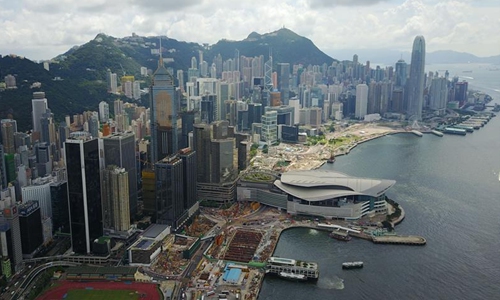HK needs '2nd return': official
By Zhang Hui and Leng Shumei Source:Global Times Published: 2020/6/9 0:03:41
City's main problems 'not economic, but politics'

An aerial view of Hong Kong. Photo: Xinhua
Hong Kong needs to "return to China for a second time," the deputy director of the Hong Kong and Macao Affairs Office of the State Council said on Monday, citing views from an international scholar as he addressed the city's current issues of governance and recognition of national identity.
Zhang Xiaoming made the remarks at an online symposium of the HKSAR government to mark the 30th anniversary of the Basic Law.
Citing Zheng Yongnian, a professor at the East Asian Institute of the National University of Singapore, Zhang said we have encountered roadblocks and challenges in implementing the "one country, two systems," including limitations of the top level system design and deficiencies in practical work. The problems are prominent in Hong Kong's governance and the will of the people, he said. Zhang said that Hong Kong's main problems are not economic or people's livelihood, but politics. On the fundamental question of what kind of Hong Kong we should build, there are serious differences and even clashes, Zhang said.
Opposition parties and external forces attempted to turn Hong Kong into an independent or semi-independent political entity, an anti-China bridgehead, and a pawn of the external forces to contain China's development, which is a major contradiction affecting the complete and accurate implementation of "one country, two systems" and Hong Kong's long-term prosperity and stability.
Zhang said the central government was forced by Hong Kong opposition parties and radical separatists to take action, and they have mistaken the restraint and the tolerance shown by the central and the SAR government as weakness, and have gone too far.
The National People's Congress (NPC) passed on May 28 the decision to establish and improve the legal system and enforcement mechanisms for Hong Kong to safeguard national security. The transfer of Hong Kong in 1997 is the handover of sovereignty; a second handover is a historic process aimed at including the city into the country's administrative system, said Li Xiaobing, an expert on Hong Kong, Macao and Taiwan studies at Nankai University in Tianjin.
Li said in the past 23 years, the central government believed in initiative efforts in Hong Kong to implement "one country, two systems," but the governance crisis in Hong Kong in recent years, including the Occupy Central movement and the anti-extradition bill protests, made the central government determined to solve the problems in Hong Kong.
The national security law will not shrink the space of "one country, two systems," said Zhang, adding that "instead, the more solid the bottom line of national security, the more space for 'one country, two systems.'"
Hong Kong will restore stability, and its business and investment environment will be improved after the law is implemented, Zhang said.
Tian Feilong, a Hong Kong affairs expert at Beihang University in Beijing, told the Global Times that in the future, more legal efforts, policies and measures, including stricter constitutional supervision over the city's legislation, administration and judiciary, as well as those to promote and protect the basis of the city, would be launched.
The national security law is the first step to approach a second return of Hong Kong, and the central government still has to do a lot in studying and promoting the systematic and social establishment in terms of education, judiciary, media, youth and supervision over autonomy, Tian said on Monday.
Many Hong Kong residents misunderstand "one country, two systems" because they relied too much on a single-faceted interpretation of the Sino-British joint declaration to stress that the lifestyle in Hong Kong would remain unchanged for 50 years after 1997, but ignored the premise of one country. Thus, some of them opposed one country, were against two systems and even took Hong Kong as an independent political entity, said Tian.
Analysts have called on Hong Kong to establish a new educational system to fit into the "one country, two systems," and several Hong Kong education officials said a comprehensive review of Hong Kong's education and assessment system was being undertaken to set things right under the principle of "one country, two systems."
On Monday, Secretary for the Civil Service in Hong Kong Patrick Nip Tak-kuen said under the "one country, two systems," civil servants of Hong Kong are also civil servants of the country, and they cannot just focus on Hong Kong alone in policy considerations, nor should they hold a hostile attitude toward the country, Hong Kong media reported.
Since April, the Hong Kong government has rolled out a series of promotional activities, including online games, exhibits, quizzes, books and a video series to commemorate the 30th anniversary of the promulgation of the Basic Law.
Adopted on April 4, 1990 by the 7th NPC and implemented on July 1, 1997 when the Hong Kong SAR was established, the Basic Law is the constitutional document of the region.
Posted in: POLITICS,HK/MACAO/TAIWAN,FOCUS NEWS